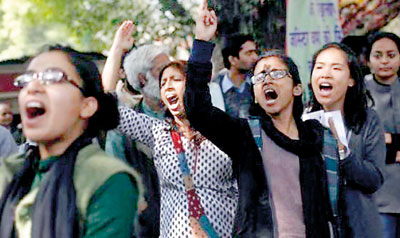Sunday Times 2
What stopped India’s “anti-rape” law from being a landmark?
View(s):NEW DELHI (Reuters) – So, three months after the outrage which sent thousands of Indians spilling out onto the streets to protest at the fatal gang rape of a woman on a bus in New Delhi, the country’s parliamentarians were forced to sit up and listen and approve a tough new law to curb rising sexual violence against women.

Indian women at last year’s anti-rape protests (Reuters)
Home Minister Sushil Kumar Shinde has hailed the new “anti-rape” law – which means repeat rapists or those who leave their victims in a vegetative state can be hanged – as a law which would create a “revolution” in the largely patriarchal country.
But how much of a landmark law is it really?
Yes, there are certainly some welcome and promising provisions – making human trafficking, acid attacks, stalking and voyeurism criminal offences, expanding the definition of rape and sexual harassment, and making gender-insensitive police and hospital authorities more accountable.
It recognises gang rape as an offence, gives space for prostitution to be seen as consensual as opposed to purely exploitative, and bars the use of a woman’s sexual history to prove consent to intercourse. But the debate on the draft law in both houses of parliament, involving politicians who are largely elderly males with patriarchal views, showed that the attitudes of some were at odds with their apparent commitment to gender equality.
“I still think that making stalking to voyeurism a punishable offence is too harsh and wrong,” said Sharad Yadav of the Janata Dal United party. “We have all followed women around in youth. And women don’t talk to men first, we men have to follow them and get them to talk. So, now will you put all young men in love in jail?”
A sign of how seriously lawmakers took the law was the sparse attendance in the lower house, where only 200 of the 545 parliamentarians turned up to vote. As a result of such attitudes, the law was watered down and prevented from being the piece of landmark, progressive legislation that many women’s rights groups had hoped for.
Stalking – initially approved as non-bailable – has become bailable for a first offence. Acid attacks carry a maximum 20-year jail term as opposed to life, and couples under 18 who have consensual sex will be criminals. Recommendations by a government panel , such as prohibiting politicians facing rape charges from standing for election and reviewing the army’s sweeping powers in conflict areas, were also ignored.
One of the biggest failures of the law was that it did not criminalise marital rape, keeping India on a par with countries such as Pakistan, China, Afghanistan and Saudi Arabia. “The anti-rape legislation that was supposed to be Parliament’s tribute to the Delhi December 16 braveheart was passed in India’s lower house on 19th March,” wrote Kavita Krishnan, secretary of the All India Progressive Women’s Association.
“Far from being a momentous and historic blow to patriarchy, however, the occasion only served to remind us what kind of patriarchal reaction we’re up against.”
Follow @timesonlinelk
comments powered by Disqus















